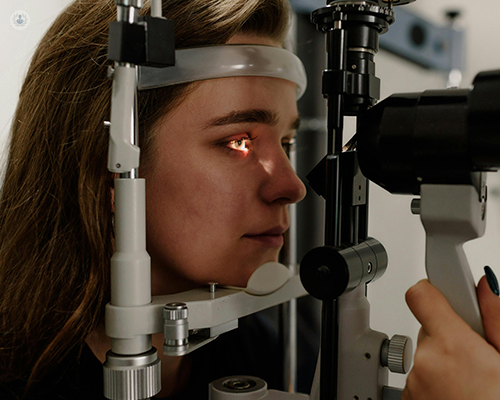What is uveitis? Symptoms, causes, and treatment explained
Escrito por:Uveitis is a complex eye condition that requires prompt and effective treatment to prevent complications. While mild cases may resolve on their own, medical intervention is often necessary for uveitis to manage inflammation and protect vision.

What is uveitis?
Uveitis is an inflammatory condition of the uvea, the middle layer of the eye. The uvea consists of the iris, ciliary body, and choroid.
What are the symptoms of uveitis?
The symptoms of uveitis can vary depending on the part of the uvea affected. Common symptoms include:
- eye redness
- eye pain
- blurred vision
- light sensitivity (photophobia)
- floaters (spots in the vision)
- decreased vision
What is the most common cause of uveitis?
The exact cause of uveitis is often unknown. However, it can be triggered by various factors, including:
- Infections: Viral, bacterial, fungal, or parasitic infections.
- Autoimmune disorders: Conditions like rheumatoid arthritis, lupus, and sarcoidosis can cause uveitis.
- Injuries: Trauma to the eye can lead to inflammation.
- Toxins: Exposure to certain chemicals or toxins.
Autoimmune disorders are among the most common causes of uveitis. The immune system mistakenly attacks the body's own tissues, leading to inflammation in the eye.
How does uveitis relate to other eye conditions like glaucoma and cataracts?
Chronic inflammation from uveitis can increase the risk of developing other serious eye conditions, including glaucoma and cataracts:
- Glaucoma: Glaucoma is an eye condition that results in optic nerve damage, ultimately leading to vision loss. Typically, this damage is caused by abnormally high pressure within the eye. Uveitis can cause or exacerbate glaucoma by affecting the eye's drainage system.
- Cataracts: A cataract is a clouding of the lens in the eye, which leads to a decrease in vision. Uveitis can accelerate the development of cataracts due to prolonged inflammation or corticosteroid treatments used to manage uveitis.
Can uveitis clear up on its own?
In some cases, mild uveitis may resolve without treatment. However, because uveitis can lead to serious complications if left untreated, it’s crucial to seek medical advice. Even if symptoms improve, underlying inflammation might persist and cause damage over time.
How is uveitis treated?
The primary goal of uveitis treatment is to reduce inflammation, relieve pain, and prevent further tissue damage. Treatment options include:
Medications
- Corticosteroids: These are the most common medications used to reduce inflammation. They can be administered as eye drops, oral tablets, injections, or implants.
- Immunosuppressive drugs: For severe or chronic uveitis, medications that suppress the immune system may be necessary.
- Antibiotics/Antivirals: If an infection causes uveitis, specific antimicrobial treatments will be used.
- Dilating eye drops: These help to relieve pain by relaxing the muscles in the eye and preventing the iris from sticking to the lens or cornea.
Surgery
Surgery for uveitis may be necessary in severe cases or when complications develop.
Surgical procedures include:
- Vitrectomy: Vitrectomy is performed to remove the vitreous gel in the eye to reduce inflammation.
- Cataract surgery: Cataract surgery is performed to remove cataracts if they develop as a result of uveitis or its treatment.
- Glaucoma surgery: Glaucoma surgery is performed to relieve intraocular pressure (IOP) caused by uveitis.
How long will I need to be on medication?
The duration of medication for uveitis depends on several factors, including the severity and cause of the inflammation, and how well the eye responds to treatment. Acute uveitis may require several weeks of medication, while chronic cases might necessitate ongoing treatment for months or even years.
Regular follow-up appointments are crucial to monitor the condition and adjust treatment as needed. Stopping medication abruptly can lead to a relapse, so it's essential to follow the ophthalmologist's guidance as prescribed.


